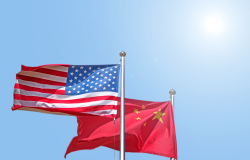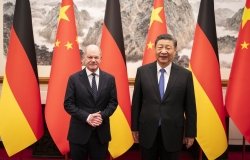Brazil after Carnaval
Read the English translation of Valor Economico's review of the positive and negative opinions of Brazil in the media and the effects of these reports on the population itself, with quotes from Paulo Sotero.
Carlos Eduardo Lins da Silva – Valor Economico, 07/21/2012
In their editorial on November 12, 2009, the magazine The Economist, generally considered to be one of the world’s finest journalistic publications (and one of the few that have seen their paid circulation go up in this century), declared: “Brazil takes off.” In the cover illustration, usually in indisputably good taste but in this case doubtful, Christ the Redeemer flew like a rocket from Corcovado towards the stars. In the introductory text to the special section on the country, the caption read: “Now, the risk to the big success story in Latin America is overconfidence.”
On July 9 of this year, the journal Financial Times, another icon of quality global journalism (and another rare example of success in a time of decline for paper media), was also definitive on the final judgment of Brazil, but in the opposite direction: “Brazil: after Carnaval.”
Is the thrust of the Christ the Redeemer-rocket so weak that it would rise a little, only to fall without The Economist having realized it? Or is the Financial Times celebrating Ash Wednesday when it never occurred? Or, again, could it be that both are incorrect in their diagnoses and that what is happening to Brazil does not correspond to either the immense success reported in 2009 nor the tremendous failure noted in 2012?
The external perceptions of a nation depend on many diverse factors, the majority of which are rather subjective. The people who construct these perceptions are entrepreneurs and executives, analysts, diplomats, artists, tourists, scholars, athletes and international correspondents, who largely compile reviews and information they receive from other people, make a synthesis of them, and spread them to the society of their home country.
Without a doubt, this century clearly articulated the world’s perception of Brazil, especially in the main centers of capitalism. This is proven objectively in global surveys of public opinion on the attitudes of several nations, such as that done by the BBC World Service.
In 2011, the positive opinion of Brazil in 26 other countries jumped significantly (from 40% to 49%), while negative opinion has dropped to only 20%, according to the BBC. With the exception of Germany and China, all other nations viewed Brazil more favorably than unfavorably. In the U.S., 60% of respondents assessed Brazil sympathetically.
Research shows that the Brazilians began to see this optimism and believe that the world appreciated them towards the end of the last decade and the beginning of this one. According to the Pew Research Center in their study of global attitudes in 2010, 8 in 10 Brazilians believed that people of other countries liked Brazil, and only 18% believed it was unpopular.
“Brazil is having its moment in the sun. But what are its national goals and what are the values that guide modern Brazil?” asks House.
Only China, Jordan, India and Indonesia, of the 22 countries surveyed, had a more courageous self-image than that of Brazil. The Pew study also showed that in 2010, 24% of Brazilians thought their country was already a world power and 53% believed that it would be in the future. Only 20% believed that Brazil would never be a world power.
The extent to which one can attribute this collective opinion to media reports on Brazil is an ongoing question. The social sciences have not reached a consensus on how the media is in fact able to influence how the public thinks and acts.
However, there is certainly an association between news in favor of Brazil in many countries at the end of the past decade and the widespread acceptance of the hypothesis that things here were going exceptionally well, especially when compared to what was happening in the rest of the world.
In 2012, encouraged by the signs that something significant was happening to the country’s international image, the government took initiatives for the first time to track it systematically. The Institute of Applied Economic Research (IPEA) submitted a questionnaire to hundreds of foreign entities with a presence in Brazil, and the Secretariat of Social Communication of the Presidency (Secom) has become a daily analysis of news about the country in international media.
The results of these two studies diverged from each other. The IPEA showed a moderately favorable perception of the country, but the Secom showed that only 15% of articles published about Brazil had negative biases, indicating that the international press has tended to be more optimistic than external agents who worked here, as noted by the journalist Claudia Antunes in a text featured in “Folha de S. Paulo” at the time.
In this same text it was stated that the Brazilian government was taking the initiative to bring a group of international journalists to the country to write about Brazil with a similarly proactive attitude.
The countermove in the media of articles, reports, interviews and negative reviews about Brazil began just months ago, and it will only be possible to verify its effect on the public later this year, or, more likely, in 2013 and 2014.
But now we can ask whether the foreign correspondents and other observers of Brazil are realizing what is happening in the country. Richard House, currently a consultant in communications in Europe, who was a correspondent for the Washington Postin Brazil and worked for The Economist and Financial Times, thinks that yes, the correspondents portray the country well.
Confronted by some Brazilians perplexed view of the concept that suggests their country is plummeting in the international media, he says: “They do not accommodate or tolerate an ‘outside-in’ perspective in an important moment of growth for their country.”
House thinks that Brazil is experiencing “a Château Pétrus phase with Coca-Cola”: many are undoubtedly dazzled with the advances obtained by their country, but they do not accept that they could be shown the many shortcomings that still exist; the country always wants to have fine wine, but sometimes they can’t escape the cheap soda.
Foreigners always had a predominantly negative image of Brazil (favelas, misery, poor children on the street, environmental devastation), thrown in with some exotic elements (samba, mulattos and soccer). This was always the world’s Brazilian stereotype for the greater part of the 20th century.
All of a sudden, the world has discovered that 19 new millionaires appear each day in Brazil, that Brazilians control huge global corporations, that here unemployment is much less grave than in Europe, that there is an immensity of oil deposits on their coasts, the their GDP has risen 7.5% in the same year that basically the rest of the world’s GDP was in decline.
At the same time, Brazil has given signals of wanting to enjoy this great moment by behaving in a way that many people saw as arrogant or presumptuous (“behaving in the same way Argentinians had when their country was doing well in comparison to Brazil, some 20 or 25 years ago” recalls House).
“Are correspondents – albeit unconsciously – seeking signs that the new kid on the block, bold, sassy and a “smart guy”, still has its problems? Of course. But the media and their clichés reflect issues that our very own Brazilians still have not responded to. Yes, the economy is enormous; yes, there is a lot of prosperity; yes, Brazil is having its moment in the sun. But what is our national goal? What are the values that guide modern Brazil?” argued House.
“My response is that it isn’t the correspondents or international agents that are confused. They are simply transmitting the signals of internal confusion from an only recently prospering Brazil that still has not reached a conclusion about their role in the world.”
Another veteran international correspondent, Paulo Sotero, who covered the United States for acclaimed Brazilian newspapers and is the current director of the Brazil Institute for the Woodrow Wilson Center for International Scholars in Washington believes that “the perception that Brazil was a success and has now turned into failure derives from economic news and reflects the opinions of market analysts”.
In his view, market analysts generally pass judgments that have “a definite tone, usually come accompanied by lectures, are invariably late , tend to exaggerate both positive and negative trends , and rarely consist of neutral analyses, since they reflect the immediate interests of the institutions that disclose the information to produce or justify results for their clients. “
One example he mentioned was that “the market euphoria that Brazil experienced started to turn sour when the government reintroduced capital controls to counter the appreciation of the real and the Central Bank started to implement a strategy of aggressive interest rate reductions, without affecting inflation the way analysts predicted”.
Sotero also mentioned an article by Ruchir Sharma, published in the May/June issue of Foreign Affairs. In addition to making various factual errors in the article , the Morgan Stanley economist announced - in a definitive tone – the end of a positive growth cycle that the country has experienced since 1999 . Sotero cited as well declarations made this month by Jim O’Neil of Goldman Sachs, who coined the acronym BRIC in 2001, saying that in the absence of stronger GDP growth rates Brazil would no longer be the B in BRIC.
In Sotero’s evaluation, “the excesses of negative evaluations today could have the same fate as those raised in the financial market following the announcement of the Real Plan, which was received with skepticism, or the argument that Brazil should follow Argentina’s Domingo Cavalo and Carlos Menem and dollarize its currency, or yet the prediction that Brazil’s GDP would fall 4% in 1999, after the devaluation of the real.”
Other than economic news, Sotero sees in the international reporting about Brazil the reflection of information disclosed and discussed by Brazilian mass media: “Reports about culture are generally positive. Those on topics such as politics and society are mixed. I would say that they tend to be negative because they reflect the news, analyses and debates in the Brazilian media, which is the primary source for correspondents and international agencies. “
For House, the coverage that was done for Rio +20, which was predominantly negative for Brazil, was only a prelude of what lies ahead in the World Cup in 2014 and 2016 Olympics. “The correspondents [sent to cover Rio+20] wrote about the slums, traffic congestion, deforestation of the Amazon, the war for nannies in the upper middle class.”
It is very common to blame the messenger when the message is unpleasant for the receiver. The international media’s coverage of Brazil may create more problems than it intends to, however, it generally relies on facts, although they may be exaggerated or unwarranted in several specific cases.
Carlos Eduardo Lins da Silva holds a PhD in communications and serves as an Associate Professor at the University of Sao Paolo. He also holds a Masters in Communication from Michigan State University, and serves as an editor for Foreign Policy magazine.
This article was originally published in Portuguese on the July 21st edition of the São Paulo daily Valor Econômico. It was translated into English by Lauren Phelps and Elizabeth Sweitzer, interns at the Wilson Center’s Brazil Institute, in Washington, D.C. See the article in its original format here.
Photograph courtesy of The Economist
About the Author


Brazil Institute
The Brazil Institute—the only country-specific policy institution focused on Brazil in Washington—works to foster understanding of Brazil’s complex reality and to support more consequential relations between Brazilian and US institutions in all sectors. The Brazil Institute plays this role by producing independent research and programs that bridge the gap between scholarship and policy, and by serving as a crossroads for leading policymakers, scholars and private sector representatives who are committed to addressing Brazil’s challenges and opportunities. Read more

Latin America Program
The Wilson Center’s prestigious Latin America Program provides non-partisan expertise to a broad community of decision makers in the United States and Latin America on critical policy issues facing the Hemisphere. The Program provides insightful and actionable research for policymakers, private sector leaders, journalists, and public intellectuals in the United States and Latin America. To bridge the gap between scholarship and policy action, it fosters new inquiry, sponsors high-level public and private meetings among multiple stakeholders, and explores policy options to improve outcomes for citizens throughout the Americas. Drawing on the Wilson Center’s strength as the nation’s key non-partisan policy forum, the Program serves as a trusted source of analysis and a vital point of contact between the worlds of scholarship and action. Read more










